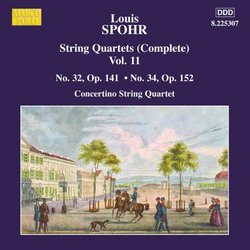| All Artists: Louis Spohr Title: Louis Spohr: String Quartets (Complete), Vol. 11 Members Wishing: 0 Total Copies: 0 Label: Marco Polo Release Date: 5/17/2005 Genre: Classical Styles: Chamber Music, Historical Periods, Classical (c.1770-1830) Number of Discs: 1 SwapaCD Credits: 1 UPC: 636943530726 |
Search - Louis Spohr :: Louis Spohr: String Quartets (Complete), Vol. 11
 | Louis Spohr Louis Spohr: String Quartets (Complete), Vol. 11 Genre: Classical
|
Larger Image |
CD Details |
CD ReviewsMore Spohr - Two Contrasting Quartets J Scott Morrison | Middlebury VT, USA | 06/13/2005 (4 out of 5 stars) "The Marco Polo effort to record all of Spohr's thirty-six string quartets continues slowly to add to the total in this, the eleventh volume in the series. In earlier issues the New Budapest Quartet was the ensemble playing, but more recently the Moscow Philharmonic Concertino String Quartet (awkward name, that) has taken over. They are perhaps not as suave as the Bupapesters but they play with commitment and a sweet tone. Spohr's quartets are very much dominated by the first violin -- Spohr himself was a violin virtuoso -- and often sound like string-accompanied violin concertos. Still, Spohr was talented as a composer even if he wasn't at the cutting edge of contemporary developments. He fills the gap in years between Beethoven and the arrival of Brahms and Schumann.
Quartet No. 32 in C Major, Op. 141, written in 1849 -- 45 years after Spohr's First Quartet -- is a sunny four-movement work notable for its lyrical thematic material. The Scherzo is of interest in that it uses, unusually, a bolero rhythm. The Finale is a merry piece that features, in the development section, a clever fugato accompaniment of the main theme. Quartet No. 34 in E Flat Major, Op. 152, was written 1855, fully fifty years after his First -- and there were two more quartets yet to come from Spohr's pen. Written in the aftermath of the crackdown after the widespread revolutionary fervor of the late 1840s, this quartet is altogether more serious than its predecessor. Nominally in a major key, the first movement opens with a melancholy, even resigned-sounding, minor-key adagio before making the transition to the major-key allegro that nonetheless retains a wistful sadness for all its faster tempo. There is some intriguing use of fugal passages in lieu of a classical development section. Not until a couple of minutes into the movement does the first violin takes its wonted predominant role. There are some attempts at lightheartedness in the Scherzo and Finale but the last movement eventually resolves into a repetition of the opening adagio theme in the cello but this time decorated by a masterful contrapuntal passage in the upper strings. The Concertino Quartet plays these quartets as if they believe in them, a necessary ingredient in performances of Spohr whose music can otherwise sound facile and light-weight in lesser hands. TT=66:10 Scott Morrison" |

 Track Listings (8) - Disc #1
Track Listings (8) - Disc #1